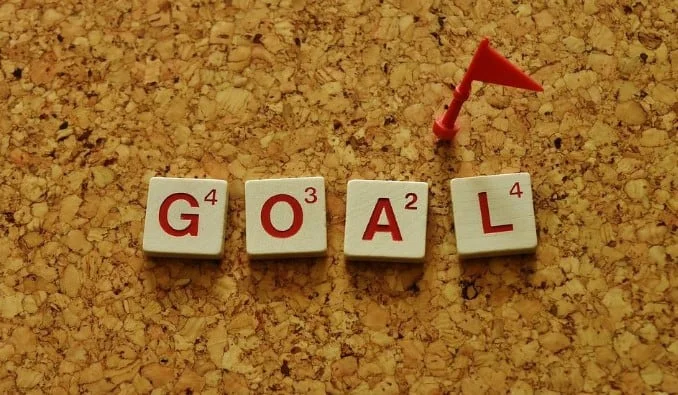Picture this:
Twenty-two players are chasing down a ball on a soccer pitch without goalposts. They’ll tire themselves out after 90 minutes but will have nothing to show for all the running around and chasing they did.
That’s exactly what living unintentionally looks like!
Not being intentional in your everyday life is the same as kicking the ball all over the pitch but making no impact.
If it feels like you’re headed nowhere, regardless of all the activities in your life, you probably need to set up some goalposts on your pitch.
Living your life on autopilot is less likely to yield any meaningful results that you’ll be proud of. If anything, it will leave you clueless regarding what works and what doesn’t.
You’ve got only one shot at life – make it count. Create a life of purpose by adopting little changes to steer you toward intentional living.
If you’re scouting the internet for ideas on living more intentionally, you’re in luck! Here are 10 tips on being intentional in life.
1. Keep Your Goals in Mind

Aligning your actions and life choices with your overall goals is one of the first steps toward living intentionally. Think about your short-term and long-term goals? What little actions toward goal setting do you need to take today to bring you closer to these goals?
These things should be top of mind for you so that your daily actions and accomplishments are geared toward your goals.
Here are a few ways to remind yourself of your set goals:
- Create a daily to-do list to help you prioritize your tasks and reduce the stress of completing projects. A proper plan will help you take charge of your day and get more important things done.
- Create a vision board of how you want your life to look in the 1, 5, or 10 years. Make it as detailed as you want by adding clippings from magazines or newspapers of your amazing body, romantic partner, dream home, etc. Place the vision board where you can easily see it every day.
2. Identify Your Values
Your values are what you consider an important thing in your life, and they determine your priorities and the choices you make.
This is why identifying your values is a crucial step in having an intentional mindset. Like your life goals, your personal core values are the yardstick for measuring whether or not your life is turning out the way you want it.
The type of person you want to be determines what your values are. These could include:
- Generosity
- Compassion
- Honesty
- Courage
- Self-reliance
- Selflessness
- Trustworthiness
- Loyalty
- Humility
Consider answering these questions to help you get clear on what your personal values are:
- What inspires you, and why are these things important to you?
- What easily gets you upset?
- What does your ideal day look like?
- What activities help you feel contented, fulfilled, and happy?
- What qualities do you wish you had more of?
3. Set Intentions Every Morning
Do your best to implement this suggestion, even if you forget every other thing in this post. Don’t start your day without zeroing on your intentions for the day. How else would you measure progress at the end of the day if you don’t set an intention for the day?
Your intention for the day can be a short affirmation that captures how you’ll like the day to play out, what you hope to achieve or the positive qualities you’ll like to manifest.
Here are a few suggestions for setting your intention for the day:
- Stand in front of a mirror, stare at your reflection, and say your intentions for the day.
- Sit up in your bed right after you wake up and say your intentions aloud or to yourself. It might help if you close your eyes while you say how you want your day to go.
- Say your intention for the day right after your morning meditation.
And while we’re still on the subject, I recommend checking out this post for tips on how to write your own affirmation or intentions for the day. Plus, you’ll find a ton of examples to help you craft suitable positive statements for yourself and your daily life.
4. Tune Out Distractions

Distractions are commonplace in our modern lives, making it easy to lose focus. No thanks to television and social media, we are in a constant battle to keep our attention and focus on our objectives and values.
As if that’s not enough, there’s peer pressure to contend with.
Being intentional in today’s world would mean tuning out all the noise and not allowing any of these distractions to dictate what you do and how you do it.
Setting goals and identifying your values are all good and fine, but you’ll hardly make any meaningful daily progress if you can’t steadily hold your focus on what’s most important to you.
This is not to say that you should go cold turkey on the media or completely cut off people from your life.
Instead, it means identifying your biggest distractions and figuring out the best way to limit or eliminate them.
5. Prioritize Your Physical and Mental Health

Multitasking and overworking are often praised in our fast-paced world, yet they are the hallmark of living an unplanned life.
Besides, consistently overworking yourself puts your body under too much stress, and that’s not good for your physical and mental health.
Being intentional with your life would be difficult if your health is in poor shape. In fact, nothing else in life matters if you don’t take care of yourself. Good physical and mental health helps you feel great about yourself, which improves your self-esteem.
To check all the items on your daily to-do list and smash your goals, be careful not to neglect your health.
Here are a few ways to prioritize your health as part of intentional living:
- Take time every day to practice self-care.
- Eat a well-balanced diet and drink enough water to stay hydrated.
- Add exercise to your daily routine to stay fit and boost your endorphin levels. If you cannot do any rigorous workout (perhaps, because of a physical disability), you can engage in physical activities that allow you to get enough body movement every day.
- Make sure to have enough rest every day. Take short breaks between work and get enough shuteye at night. Don’t try to do tomorrow’s work today!
6. Practice Self-Compassion
One of the easiest mistakes many people make when they set out to live a more intentional life is being too hard on themselves when they make mistakes.
Beating yourself up for your slips is setting yourself up for low self-esteem because it takes consistent negative self-talk to keep yourself in regret.
Mistakes are essential parts of making progress. Making mistakes simply means you are in the process of learning, and that’s exactly what leads to achievements and successes.
Be kind to yourself when you falter and fall. Life shows you your inadequacies through mistakes, but the goal is to help you improve and not pull you down.
Pick yourself up with warm and kind self-talk when you fall. Pat yourself on the back and try again more intelligently the next time.
Be your own best friend and speak to yourself from that point of view rather than constantly judging yourself.
If your life seems to be spiraling out of control and it is becoming more difficult to be warm and understanding toward yourself, try slowing things down. Meditation is a good tool to slow things down, avoid self-criticism, center yourself, and find compassion.
7. Practice Mindfulness More Often
Living a fast-paced life is a recipe for stress and anxiety. Slow things down by inhabiting your moments.
Be present.
Really, be present more often.
For example:
- When you wake up in the morning, lay in bed for a couple of minutes before getting up. Don’t just rush into your day as soon as you get out of bed.
- When you eat, use your senses to notice the taste, aroma, and texture of the food. Avoid distractions from the TV or your phone.
- When you do the laundry, cook, or do your home chores, think about the purpose behind these activities rather than merely going through the motions. Think thoughts such as, “I love taking care of my home,” or “I love living in a clean environment.”
Mindfulness might seem like a big deal, but the practice can help you live more deliberately rather than living on autopilot. Besides, research shows that mindfulness can reduce stress, improve focus, and boost your working memory.
8. Carve Out Time for Self-Reflection

As the popular maxim goes, “An unexamined life is not worth living.” Self-reflection is how you measure your progress and determine whether or not you are living according to your core values and purpose.
As often as possible, take a few minutes to ask yourself if your life is a reflection of your priorities and values.
It is okay if you go off track once in a while; after all, no one is perfect. But go a step further to think of the little changes you can make to bring you back on track with the original vision for your life.
While you can reflect and course-correct at any time of the day, consider doing it in the evening before going to bed. This will help you set new intentions for the next day.
9. Mind What You Spend Your Money On
Here’s a seemingly small shift that can bring significant positive change in your finances in the long run.
Before you buy anything, try to pause and ask what value that thing will add to your life before reaching for your wallet. In other words, be intentional about spending your money if you want to increase your chances of reaching your long-term financial goals without too much stress.
While you may not be able to completely rule out some spur-of-the-moment purchases, being mindful of what you spend your money on can minimize unnecessary spending.
If you earn money by trading your time for money (like many people do), you should remember that you are exchanging the hours of your life with what you are spending money on. This realization can help you be more mindful about spending your money.
10. Declutter Your Space, Mind, and Life
Does it feel like you need to keep tabs on too many things in your life? You might have a lot of clutter in your life if you feel stressed out most of the time.
Being intentional in life involves letting go of what you no longer need and keeping only things that serve you.
Decluttering can help you focus on the things that matter most to you. But before you declutter, take the time to decide what is important to you.
Once you’ve identified the essentials and what you’ll like to keep, go ahead and do away with the excess items. Holding onto them will only drag you back and prevent you from creating the happy life you know you deserve.
When you declutter, ensure to let go of:
- Unnecessary belongings in your home and workspace.
- Junk files and apps on your computer and phone.
- Hurtful thoughts and emotions from the past (forgive those who hurt you so that you can move on).
- Toxic friends and people who don’t add value to your life.
Live Intentional One Day at a Time
The good thing about living an intentional life is that you don’t have to tear everything down and rebuild your life from scratch. As you probably already know, keeping up with such drastic changes can be difficult.
All you need are small shifts in your day-to-day activities. You don’t have to do everything on this list at the same time – that would be overwhelming.
Start today to infuse purpose or intentionality into what you are already doing. Remember to take baby steps and focus on living more intentionally, one day at a time.




